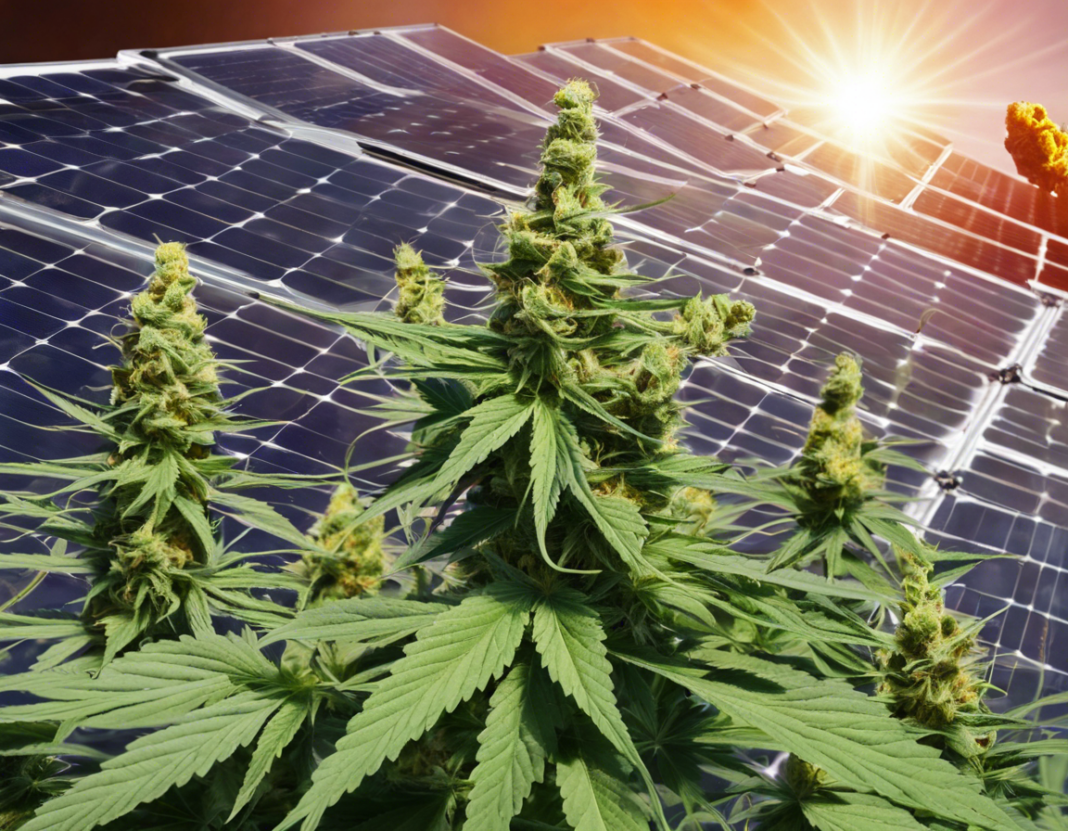The cannabis industry has seen significant growth in recent years due to changing regulations and increased acceptance of the plant for medical and recreational use. However, the cultivation of cannabis can be energy-intensive, leading to a significant environmental impact. As the industry looks for ways to become more sustainable, solar energy has emerged as a viable solution to reduce carbon footprints and operational costs.
The Environmental Impact of Cannabis Cultivation
Cannabis cultivation requires a controlled environment with specific lighting, heating, and cooling needs. Traditional cultivation methods rely heavily on grid electricity, which is often sourced from fossil fuels, contributing to greenhouse gas emissions and environmental degradation. According to a report by the New Frontier Data, indoor cannabis cultivation alone accounts for about 1% of total electricity consumption in the United States, with a carbon footprint equivalent to that of three million cars.
The Benefits of Solar Energy for Cannabis Cultivation
Solar energy offers a sustainable alternative to traditional energy sources for cannabis cultivation. By harnessing the power of the sun, cultivators can significantly reduce their reliance on grid electricity and lower their operational costs. Some of the key benefits of using solar energy for cannabis cultivation include:
-
Cost Savings: While the initial investment in solar panels and equipment may be significant, the long-term savings on electricity bills can outweigh the upfront costs. With proper planning and system design, solar-powered cannabis cultivation can result in substantial cost savings over time.
-
Environmental Sustainability: Solar energy is a clean and renewable resource that produces no greenhouse gas emissions during operation. By switching to solar power, cannabis cultivators can significantly reduce their carbon footprint and contribute to environmental conservation efforts.
-
Energy Independence: Solar energy systems provide cultivators with greater energy independence and resilience. By generating their electricity on-site, growers can reduce their vulnerability to power outages and fluctuations in utility prices.
-
Marketing Advantage: Consumer awareness and demand for sustainable products are on the rise. By powering their operations with solar energy, cannabis cultivators can differentiate themselves in the market, attract environmentally-conscious consumers, and enhance their brand image.
Implementing Solar Energy Solutions for Cannabis Cultivation
When considering solar energy solutions for cannabis cultivation, several factors need to be taken into account to ensure optimal performance and efficiency. These factors include:
-
Site Assessment: Conduct a thorough assessment of the cultivation site to determine the available space for solar panel installation, sunlight exposure, and energy requirements. Factors such as shading, roof orientation, and local climate conditions can impact the feasibility of a solar energy system.
-
System Sizing: Properly size the solar energy system to meet the specific energy needs of the cannabis cultivation operation. Consider factors such as lighting, HVAC systems, irrigation, and other electrical loads to determine the appropriate system capacity.
-
Battery Storage: Integrating battery storage solutions with solar energy systems can help store excess energy generated during the day for use during periods of low sunlight or high demand. Battery storage systems can enhance energy independence and resilience.
-
Regulatory Compliance: Familiarize yourself with local regulations, permitting requirements, and incentives related to solar energy installations for cannabis cultivation. Ensure compliance with building codes, zoning ordinances, and utility interconnection standards.
-
Maintenance and Monitoring: Regular maintenance and monitoring of the solar energy system are essential to ensure optimal performance and longevity. Periodic inspections, cleaning of solar panels, and performance monitoring can help identify and address issues early on.
Frequently Asked Questions (FAQs)
Q: What are the upfront costs of installing a solar energy system for cannabis cultivation?
A: The upfront costs of a solar energy system depend on various factors such as system size, location, equipment quality, and installation complexity. However, with the long-term savings on energy bills, many cultivators find the investment to be cost-effective.
Q: Can solar energy systems meet the high energy demands of cannabis cultivation operations?
A: Yes, solar energy systems can be designed to meet the energy requirements of cannabis cultivation operations. By appropriately sizing the system and incorporating energy-efficient practices, cultivators can effectively power their facilities with solar energy.
Q: Are there any incentives or rebates available for installing solar energy systems for cannabis cultivation?
A: Many states offer incentives, tax credits, and rebates for solar energy installations, including those for agricultural businesses like cannabis cultivation. It is advisable to research available incentives and consult with solar energy providers to maximize potential savings.
Q: How long does it take to recoup the investment in a solar energy system for cannabis cultivation?
A: The payback period for a solar energy system can vary based on factors such as energy consumption, system size, local electricity rates, and available incentives. In many cases, cultivators can recoup their investment within 3 to 7 years through energy savings.
Q: Can solar energy systems be integrated with existing facilities or greenhouses for cannabis cultivation?
A: Yes, solar energy systems can be integrated with existing facilities or greenhouses for cannabis cultivation. Solar panels can be mounted on rooftops, carports, or ground-mounted structures, depending on the available space and sunlight exposure.
In conclusion, harnessing the power of solar energy for cannabis cultivation offers a sustainable and cost-effective solution to reduce environmental impact and operational costs. By adopting solar energy systems and implementing best practices, cannabis cultivators can enhance their sustainability efforts, improve energy efficiency, and position themselves as leaders in the emerging green cannabis industry.

